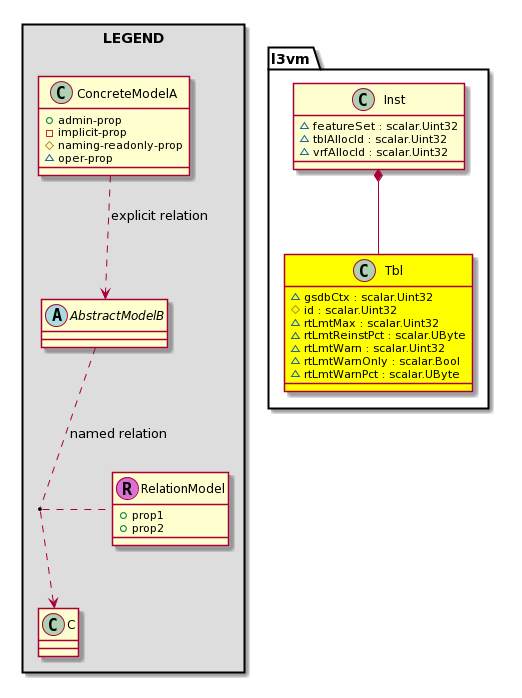| Properties Summary |
| Defined in: l3vm:Tbl |
|
scalar:Uint32
|
gsdbCtx (l3vm:Tbl:gsdbCtx)
The value of a global shared database (GSDB) context associated with an interface. The GSDB context is set to a non-zero value when a GSDB update is in progress for an interface, such as a VRF-membership update.
|
|
scalar:Uint32
|
id (l3vm:Tbl:id)
An identifier .
|
|
scalar:Uint32
|
rtLmtMax (l3vm:Tbl:rtLmtMax)
The max routes.
|
|
scalar:UByte
|
rtLmtReinstPct (l3vm:Tbl:rtLmtReinstPct)
The route limit reinstall threshold in percentage.
|
|
scalar:Uint32
|
rtLmtWarn (l3vm:Tbl:rtLmtWarn)
The route warn limit.
|
|
scalar:Bool
|
rtLmtWarnOnly (l3vm:Tbl:rtLmtWarnOnly)
An internal runtime attribute that indicates if l3vm clients will generate a warning when a warning threshold is reached.
|
|
scalar:UByte
|
rtLmtWarnPct (l3vm:Tbl:rtLmtWarnPct)
An internal runtime attribute that stores the route limit warning threshold (in percentage) for a table.
|
childAction
Type: mo:ModificationChildAction
Primitive Type: scalar:Bitmask32
Units: null
Encrypted: false
Access: implicit
Category: TopLevelChildAction
Comments:
-
Delete or ignore. For internal use only.
| |
| Constants |
| deleteAll |
16384u |
deleteAll |
NO COMMENTS
|
| ignore |
4096u |
ignore |
NO COMMENTS
|
| deleteNonPresent |
8192u |
deleteNonPresent |
NO COMMENTS
|
| DEFAULT |
0 |
--- |
This type is used to
|
|
dn
Type: reference:BinRef
Units: null
Encrypted: false
Access: implicit
Category: TopLevelDn
Comments:
-
A tag or metadata is a non-hierarchical keyword or term assigned to the fabric module.
gsdbCtx
Type: scalar:Uint32
Units: null
Encrypted: false
Access: oper
Category: TopLevelRegular
Comments:
-
The value of a global shared database (GSDB) context associated with an interface. The GSDB context is set to a non-zero value when a GSDB update is in progress for an interface, such as a VRF-membership update.
id
Type: scalar:Uint32
Units: null
Encrypted: false
Naming Property -- [NAMING RULES]
Access: naming
Category: TopLevelRegular
Comments:
-
An identifier .
modTs
Type: mo:TStamp
Primitive Type: scalar:Date
Units: null
Encrypted: false
Access: implicit
Category: TopLevelRegular
Comments:
-
The time when this object was last modified.
| |
| Constants |
| never |
0ull |
never |
NO COMMENTS
|
| DEFAULT |
never(0ull) |
never |
NO COMMENTS
|
|
rn
Type: reference:BinRN
Units: null
Encrypted: false
Access: implicit
Category: TopLevelRn
Comments:
-
Identifies an object from its siblings within the context of its parent object. The distinguished name contains a sequence of relative names.
rtLmtMax
Type: scalar:Uint32
Units: null
Encrypted: false
Access: oper
Category: TopLevelRegular
Comments:
-
The max routes.
rtLmtReinstPct
Type: scalar:UByte
Units: null
Encrypted: false
Access: oper
Category: TopLevelRegular
Comments:
-
The route limit reinstall threshold in percentage.
rtLmtWarn
Type: scalar:Uint32
Units: null
Encrypted: false
Access: oper
Category: TopLevelRegular
Comments:
-
The route warn limit.
rtLmtWarnOnly
Type: scalar:Bool
Units: null
Encrypted: false
Access: oper
Category: TopLevelRegular
Comments:
-
An internal runtime attribute that indicates if l3vm clients will generate a warning when a warning threshold is reached.
| |
| Constants |
| no |
false |
--- |
NO COMMENTS
|
| yes |
true |
--- |
NO COMMENTS
|
| DEFAULT |
no(false) |
--- |
NO COMMENTS
|
|
rtLmtWarnPct
Type: scalar:UByte
Units: null
Encrypted: false
Access: oper
Category: TopLevelRegular
Comments:
-
An internal runtime attribute that stores the route limit warning threshold (in percentage) for a table.
status
Type: mo:ModificationStatus
Primitive Type: scalar:Bitmask32
Units: null
Encrypted: false
Access: implicit
Category: TopLevelStatus
Comments:
-
The upgrade status. This property is for internal use only.
| |
| Constants |
| created |
2u |
created |
In a setter method: specifies that an object should be created.
An error is returned if the object already exists.
In the return value of a setter method: indicates that an object has been created.
|
| modified |
4u |
modified |
In a setter method: specifies that an object should be modified
In the return value of a setter method: indicates that an object has been modified.
|
| deleted |
8u |
deleted |
In a setter method: specifies that an object should be deleted.
In the return value of a setter method: indicates that an object has been deleted.
|
| DEFAULT |
0 |
--- |
This type controls the life cycle of objects passed in the XML API.
When used in a setter method (such as configConfMo), the ModificationStatus
specifies whether an object should be created, modified, deleted or removed.
In the return value of a setter method, the ModificationStatus indicates the actual
operation that was performed. For example, the ModificationStatus is set to "created"
if the object was created. The ModificationStatus is not set if the object was neither
created, modified, deleted or removed.
When invoking a setter method, the ModificationStatus is optional:
If a setter method such as configConfMo is invoked and the ModificationStatus
is not set, the system automatically determines if the object should be created or modified.
|
|

